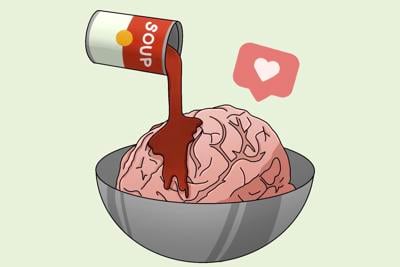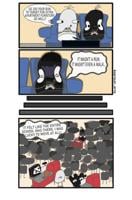Two videos, side-by-side, have become the normal way to consume media as our brains desperately search for as much stimulation as possible. In order to maintain users’ attention, TikTok and other social media videos are paired with tutorials for slime or a playthrough of Subway Surfers.
In the last six years, our attention spans have shortened to a mere 47 seconds from an average of 2.5 minutes back in 2004. It’s no secret that social media has damaged mental health since its creation, but the negative effects it has on our brains’ functionality is often overlooked.
Fernanda Duarte, an assistant professor for communication and researcher in media and technology, said we can actually re-train our brains to lengthen our attention spans — if we want to. It’s a matter of what the user’s goals are when engaging with social media. Do you want to read a book, or do you want to scroll Tiktok?
To increase attention span, Duarte says to “take the time, realize that it's gonna take a little while to shift from this high speed of overconsumption of information, which is all around you, and to [recluse] yourself in to take on a more introverted form of media consumption.”
Not only are our attention spans rapidly shortening, but media literacy, which is the ability to think critically about digital media, is also at a decline.
A contributing factor to this decline is the TikTok “blue comment,” which is a tool that places keywords from a video at the top of its comment section, allowing users to quickly find related or explanatory videos. At first, this tool was helpful for clarifying obscure slang or searching recipes and outfits, but it has since become a tool that defines the simplest of concepts due to people giving up on utilizing context clues. Why would you do anything besides ask for the answer when it’s a tap away?
I found myself thoughtlessly tapping the blue comment before even finishing videos and knew it was time to reevaluate the way I spend my free time. After much deliberation regarding “What if my friends want to send me something?” and “What will I miss?” I decided to delete my TikTok. I figured that if I could feel my brain cells shriveling, it was probably for the best. And, if my friends decide a TikTok is really that important, they text it to me. So, I’m not totally out of the loop.
Social media began as a way to connect with people you know and post entertaining photos and videos, but as technology advanced, so did the use of these platforms.
More recently, social media has been a way to share educational information on a range of topics like politics, mental health and general wellness. However, because it’s no longer expected to logically conclude for yourself whether or not a post is fake, the validity of content isn’t questioned. It’s assumed a bot has done the work already. Society should not rely on third-party fact-checkers and AI tools to do that job for us. This can cause a dangerous spread of misinformation.
“[Social media knows] that we like our comfort zones, so they are always feeding us redundant content, because they know that's going to get our attention, and we're gonna just get lost in that mindless, endless scrolling,” Duarte said. “There is a lot of harm that can come from that, particularly in terms of the spread of misinformation, bias confirmation.”
To combat this, I recommend resisting the urge to tap the blue comment, which gives the algorithm the exact engagement it wants, and take a moment to think about the implications of a video on your own. In addition to improving critical thinking ability, AI is wrong quite often, and might not give you the most accurate answer. Over time, it’ll get easier to quickly identify misinformation or suspicious content yourself.
Reading is a great way to improve attention span as well, which, in turn, makes it easier to identify fake posts. Just as it will get easier and faster to identify misleading content, so will reading.
Duarte encourages us not to frame the task of reading a book as something that is tiring.
“It is hard because your brain is being wired in a way that prioritizes overstimulation, and reading a book simulates our brain in a different way,” Duarte said. “We need to take some time to reground and recenter before you take on a task that might stimulate you differently.”
With enough time and practice, it’s possible to both improve our ability to think critically as well as and stay focused long enough to identify harmful content — without Subway Surfers in the background.




(0) comments
Welcome to the discussion.
Log In
Keep it Clean. Please avoid obscene, vulgar, lewd, racist or sexually-oriented language.
PLEASE TURN OFF YOUR CAPS LOCK.
Don't Threaten. Threats of harming another person will not be tolerated.
Be Truthful. Don't knowingly lie about anyone or anything.
Be Nice. No racism, sexism or any sort of -ism that is degrading to another person.
Be Proactive. Use the 'Report' link on each comment to let us know of abusive posts.
Share with Us. We'd love to hear eyewitness accounts, the history behind an article.